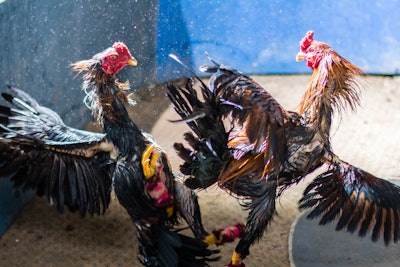
Just days before the prohibition of cockfighting goes into effect in all U.S. territories, political leaders of Puerto Rico are still hoping that the implementation of the law will be halted or postponed.
“This is an industry that represents more than $18 million in our economy and also more than 27,000 direct and indirect jobs on the island,” Jenniffer González, Puerto Rico’s resident commissioner in the U.S. House of Representatives (a non-voting member of the Congress), told NPR News.
According to González, the island has been in an economic recession for 13 years and is renegotiating its multi-billion-dollar debt, so the ban would affect not only those who own fighting birds but also grain suppliers, cage manufacturers, veterinarians and more. There are more than 60 cockfighting arenas in Puerto Rico, according to NPR.
The U.S. Congress banned cockfights last year in an amendment to the Farm Bill, but there was a year given for the transition, so the ban will come into effect on December 20. The members of congress who proposed the change argue that cockfights are already illegal in the 50 states of the United States, so the same rule should be applied in all territories.
The Humane Society of the United States (HSUS) is the organization behind the ban, arguing that cockfights are a form of animal cruelty.
Johnny Ríos, a Puerto Rican cockfighter with more than 50 years in the business, told NPR that, after the ban, it is most likely that the cockfights will continue illegally. “Most of the people, most of the cockfighters, the true ones — they're going to continue on fighting. You're going to see all the chicks that I got now for next year”.
Protests against the ban, complaint to Congress
To continue the pressure so that cockfighting is not prohibited, a group of veteran war cockfighters held a protest at The Humane Society of Puerto Rico (an animal shelter) in Guaynabo, on December 7. Although they wanted to leave some birds for the organization to take care of, no employee received them, according to the Puerto Rican newspaper El Nuevo Día.
“I reiterate my rejection to the cockfights ban. With the delegates of the other territories, we worked together so that this amendment was not given, but this is the grossest portrait of being a colony; without senators elected by Puerto Rico, much less a delegation in the House with a vote,” Gonzalez wrote on her Twitter account (@RepJenniffer).
On the other hand, Puerto Rican senator José Luis Dalmau explained in the radio station WKAQ that the law would be difficult to implement “if the cockfighters do not interfere with interstate commerce,” that is, “if computers, credit cards are not used, if outside things are not used for cockfights, cockfights can probably continue.”
Dalmau said the ban would be a problem for the U.S. government because many cockfighters have federal loans, so they’re not going to be able to pay them without a job. Therefore, he presented a bill in the Puerto Rican Legislature to ask the federal Congress for an extension in the implementation of the ban.
“I don't know what they are going to do with a million birds (after the ban). The birds fight by nature, they are fighters... Killing them would be crueler,” he added.
For Guam, the cockfights ban will be the ‘lowest priority’
Meanwhile, the senators of Guam — one of the U.S. unincorporated territories where cockfighting will also be banned — announced that it will be ignoring the law, according to The Guam Daily Post.
“No input from the people of Guam was ever received. As a result, the Guam Legislature passed an amendment that would make spending local funds to enforce this unfunded mandate as the lowest priority for the government of Guam,” the Legislature announced in August through the office of Speaker Tina Muña Barnes.















